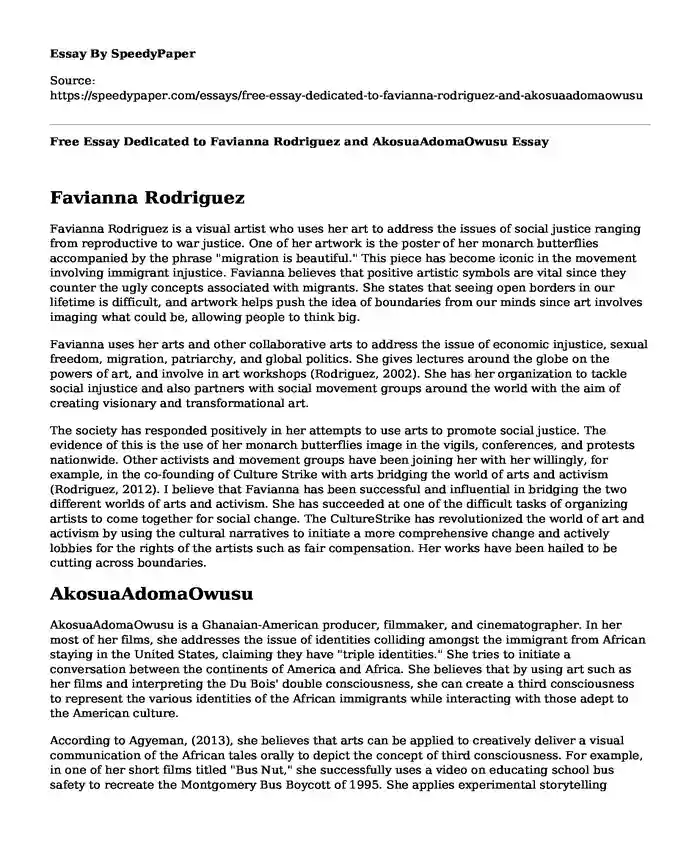
| Type of paper: | Essay |
| Categories: | Personality Art |
| Pages: | 3 |
| Wordcount: | 680 words |
Favianna Rodriguez
Favianna Rodriguez is a visual artist who uses her art to address the issues of social justice ranging from reproductive to war justice. One of her artwork is the poster of her monarch butterflies accompanied by the phrase "migration is beautiful." This piece has become iconic in the movement involving immigrant injustice. Favianna believes that positive artistic symbols are vital since they counter the ugly concepts associated with migrants. She states that seeing open borders in our lifetime is difficult, and artwork helps push the idea of boundaries from our minds since art involves imaging what could be, allowing people to think big.
Favianna uses her arts and other collaborative arts to address the issue of economic injustice, sexual freedom, migration, patriarchy, and global politics. She gives lectures around the globe on the powers of art, and involve in art workshops (Rodriguez, 2002). She has her organization to tackle social injustice and also partners with social movement groups around the world with the aim of creating visionary and transformational art.
The society has responded positively in her attempts to use arts to promote social justice. The evidence of this is the use of her monarch butterflies image in the vigils, conferences, and protests nationwide. Other activists and movement groups have been joining her with her willingly, for example, in the co-founding of Culture Strike with arts bridging the world of arts and activism (Rodriguez, 2012). I believe that Favianna has been successful and influential in bridging the two different worlds of arts and activism. She has succeeded at one of the difficult tasks of organizing artists to come together for social change. The CultureStrike has revolutionized the world of art and activism by using the cultural narratives to initiate a more comprehensive change and actively lobbies for the rights of the artists such as fair compensation. Her works have been hailed to be cutting across boundaries.
AkosuaAdomaOwusu
AkosuaAdomaOwusu is a Ghanaian-American producer, filmmaker, and cinematographer. In her most of her films, she addresses the issue of identities colliding amongst the immigrant from African staying in the United States, claiming they have "triple identities." She tries to initiate a conversation between the continents of America and Africa. She believes that by using art such as her films and interpreting the Du Bois' double consciousness, she can create a third consciousness to represent the various identities of the African immigrants while interacting with those adept to the American culture.
According to Agyeman, (2013), she believes that arts can be applied to creatively deliver a visual communication of the African tales orally to depict the concept of third consciousness. For example, in one of her short films titled "Bus Nut," she successfully uses a video on educating school bus safety to recreate the Montgomery Bus Boycott of 1995. She applies experimental storytelling approach that is used to raise the issue of social injustice such as slavery, race, and colonialism by juxtaposing images that spark conversations. The artist has raised money which is used to reopen an abandoned movie theatre in Accra, Ghana, known as the Rex. The primary purpose of the theatre is to act as a training engagement space for emerging filmmakers and artists in Ghana.
AkosuaAdomaOwusu, in my opinion, is one of the talented artists from Africa as shown by her tremendous achievements within a short period. In all her works to depict the issue of third consciousness among the African immigrants in the united states by applying the concepts from the African heritage. The whole world recognizes the works of AkosuaAdomaOwusu since her films always get screened in prestigious film festivals, galleries, museums, and universities (Ellerson, 2013). One of her short film titled Reluctantly Queer produced in 2016 received the nomination to the Golden Bear and Teddy Award in 2016.
References
Agyeman, E. (2013). AKOSUA ADOMA OWUSU EXPLORING" THREENESS." INTERNATIONAL REVIEW OF AFRICAN AMERICAN ART, 24(3), 11-14.
Ellerson, Beti. "African Women and the Documentary: Storytelling, Visualizing History, from the Personal to the Political." Black Camera 8, no. 1 (2016): 223-239.
Rodriguez, F. (2002). Artist.
Rodriguez, F. (2012). New Bus Ad Campaign Against Predatory Payday Loans. Blog entry by Favianna Rodriguez, July, 4.
Cite this page
Free Essay Dedicated to Favianna Rodriguez and AkosuaAdomaOwusu. (2022, Jul 04). Retrieved from https://speedypaper.com/essays/free-essay-dedicated-to-favianna-rodriguez-and-akosuaadomaowusu
Request Removal
If you are the original author of this essay and no longer wish to have it published on the SpeedyPaper website, please click below to request its removal:
- Personal Essay Example: Persistence Brings Success
- The Invention of Wings by Sue Monk - A Literary Essay Sample
- Free Essay Sample on Boardroom Diversity
- Free Essay with Google SWOT Analysis
- L.A. Confidential - Movie Review Essay Example
- Essay Example on Impact of Technology and Social Media on People
- Free Essay: Fat-soluble and Water-soluble Vitamins
Popular categories




